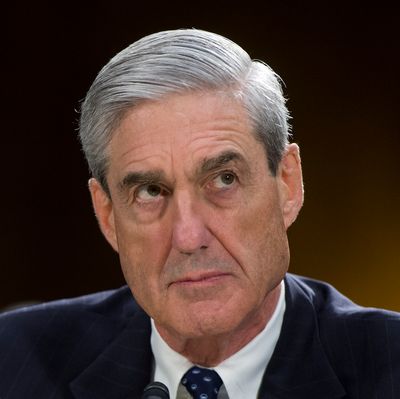
Donald Trump did not like the idea of James Comey investigating his associates. So he fired the FBI director.
But then Comey turned out to be a “leaker” — and Deputy Attorney General Rod Rosenstein turned out to have some shred of personal integrity. Soon, a special prosecutor was investigating Trump’s aides — and, quite likely, the president himself.
And Trump really doesn’t like the idea of that. Last week, we learned that Jeff Sessions had offered his resignation after the president berated him for recusing himself from the investigation into Russian hacking — and thereby enabling Rosenstein to appoint the special prosecutor who is now sifting through the skeletons in Trump’s capacious closets.
So, the president would clearly love to fire Robert Mueller. And as anyone who’s familiar with the history of the Nixon presidency knows, Trump has the right to do so. Special prosecutors serve at the president’s pleasure (for some stupid reason). In fact, the only genuine constraints on the president’s capacity to suspend the rule of law are political. Many legal analysts believe that the president cannot be indicted while in office. And even if he could, Trump retains the power of the pardon.
Congress is the one entity that can hold the president accountable. But it’s controlled by conservative Republicans who have, historically, shown more deference to right-wing media than the norms undergirding our republic.
And some in the right-wing media are already telling Trump what he wants to hear.
Shortly after Mueller’s appointment was announced, Newt Gingrich called the Republican former FBI director a “superb choice.” “His reputation is impeccable for honesty and integrity,” the former House Speaker and leading Trump sycophant tweeted.
Alas, Newt’s reputation on those fronts is extremely peccable.
Meanwhile, Ann Coulter argues that Mueller no longer has anything to investigate.
As Vox’s Matt Yglesias notes, there are a few problems with this theory:
Former National Security Adviser Michael Flynn appears to be in hot water regarding his secret sources of foreign income, Attorney General Jeff Sessions made false statements under oath regarding his meetings with Russian Ambassador Sergey Kislyak, senior adviser Jared Kushner seems to have made false sworn statements on his security clearance paperwork regarding meeting an executive at a Russian bank that’s widely seen as a front for Russian intelligence, and Trump campaign chair Paul Manafort is facing questions about possible money laundering. That’s all the kind of thing you might want investigated by someone outside the normal Department of Justice chain of command.
Additionally, in last week’s testimony, Comey strongly suggested that Mueller is now investigating the possibility that Trump obstructed justice when he asked his FBI director to lay off Michael Flynn.
Over at the Washington Examiner, Byron York pursues a line closer to Gingrich’s: Mueller is biased because of his long working relationship with James Comey.
“Comey is a good friend of special counsel Robert Mueller,” York writes. “Such a good friend, for about 15 years now, that the two men have been described as ‘brothers in arms.’”
York’s piece does not directly argue that Mueller’s relationship with Comey renders him unfit to serve in his current capacity. And the reporter couldn’t find any legal expert willing to make that argument on the record. But he did find four lawyers who were happy to make the case, under the cover of anonymity.
None of these arguments are good. If Trump fired Mueller, the mainstream media and general public would not find such defenses compelling.
But then one could say the same thing about the defenses Republicans deployed at Comey’s hearing last week.
A day ago, actual adult senators argued that when the president tells his FBI director “I hope” you will drop this investigation into my friend — after asking everyone else to leave the room so he and the head of federal law enforcement could talk in private — that’s merely an innocent expression of the commander-in-chief’s fondest wishes (and this remains true even if the president later fires that FBI director for pursuing an investigation he didn’t approve of).
Congressional Republicans have already concluded that demanding the head of federal law enforcement pledge personal fealty to you — and then firing him for failing to demonstrate that fealty — is concerning, but not disqualifying behavior for a president to engage in. Put more precisely: They’ve decided that such conduct does not constitute an abuse of power worthy of impeachment.
And if the GOP believes that (or has decided that it’s politically expedient to pretend to), it’s far from clear that they’d see the firing of a special prosecutor much differently.






























